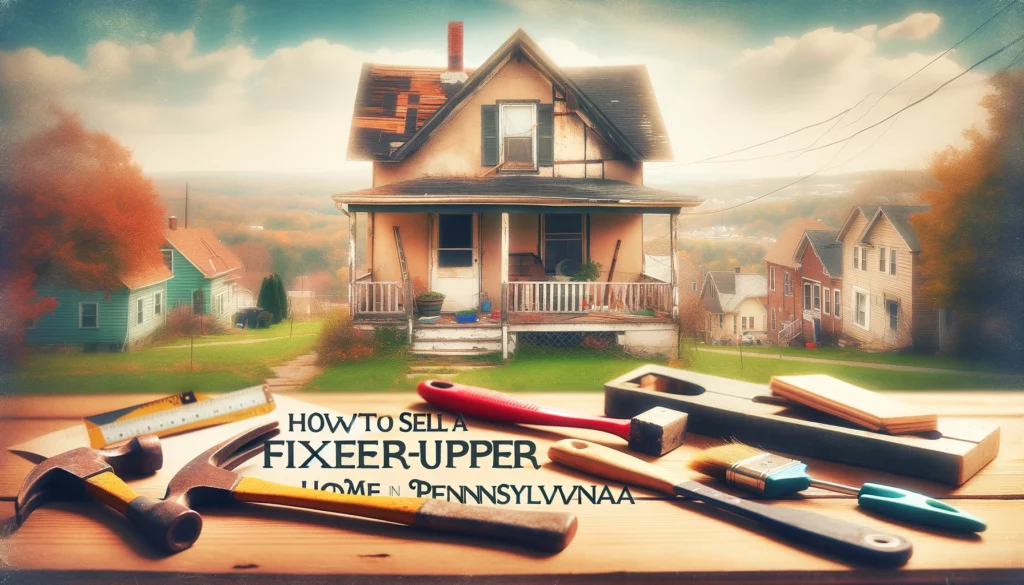How to Sell a Fixer-Upper Home in Pennsylvania

Introduction
If you’re searching for how to sell a fixer-upper home in Pennsylvania, you likely find yourself in a difficult situation. Your house needs repairs, and you may feel overwhelmed by the cost and effort required to get it ready for the traditional real estate market. Maybe you’re facing financial constraints or simply don’t have the time or energy to deal with the renovation process. Perhaps you’re hoping to avoid the lengthy process of waiting for the right buyer who might want to take on a fixer-upper.
You probably have questions like: How much will repairs cost? How long will it take to fix up my home? Should I even bother with repairs, or is it better to sell as-is? You’re likely concerned about losing money in the long run, and you’re looking for an answer that helps you decide the best way to sell your property without getting stuck with a huge renovation bill or waiting months for a buyer to come through.
This blog post is for you. By the end of it, you’ll know all your options for selling a fixer-upper home in Pennsylvania, including the potential costs, benefits, and risks of each approach. We’ll break down the pros and cons of selling to a real estate investor for cash versus trying to sell the home through a traditional route. And we’ll address how to evaluate whether it’s worth fixing up your home before selling, or if you’re better off selling as-is.
How to Sell a Fixer-Upper Home in Pennsylvania
Selling a fixer-upper home in Pennsylvania can be a daunting task, but with the right strategy, you can make the process much smoother. Whether your house needs a little TLC or extensive renovations, the decision to sell a fixer-upper is often driven by the need for a quick sale, avoiding costly repairs, or simply moving on to a new chapter in life.
The first thing to understand is that the real estate market in Pennsylvania varies widely based on the region. In larger cities like Philadelphia, the market might be competitive, but there’s still a high demand for properties that need work. In more rural areas, however, selling a fixer-upper might be more challenging, especially if there are fewer buyers willing to invest in properties that need significant repairs.
If you’re considering selling your home as-is without making repairs, there are several important factors to consider. You’ll need to weigh the financial benefits of skipping repairs against the potential loss in sale price. The main question to ask is: Do you need repairs to sell your house?
If you’re uncertain whether repairs are necessary to sell your home, read our detailed post on “Do You Need Repairs to Sell My House?” for insights.
Should You Repair Your Home Before Selling?
One of the first questions you’ll need to answer when selling a fixer-upper in Pennsylvania is whether it’s worth putting money into repairs before listing your property. The answer depends on several factors, including the condition of your home, the local real estate market, and how much you’re willing to invest.
If your home only needs minor cosmetic fixes such as fresh paint or updated fixtures, then spending a little money on repairs may boost your home’s value and make it more appealing to potential buyers. For instance, a small kitchen renovation or bathroom update could increase your home’s resale value by 5% to 10%. According to Remodeling magazine’s Cost vs. Value report, minor kitchen remodels in Pennsylvania typically see a return on investment (ROI) of 80% or more.
However, for more significant repairs—such as foundation issues, a leaky roof, or outdated electrical wiring—the costs may outweigh the potential return. These repairs can run into the thousands of dollars, and while they may increase the marketability of your home, they won’t necessarily guarantee a higher sale price.
For example, a roof replacement in Pennsylvania can cost anywhere from $5,000 to $10,000, depending on the size of the home and materials used. Foundation repairs can easily exceed $15,000, making it less likely that you’ll recoup these expenses in a higher selling price.
Before making any major repairs, consider getting an appraisal or a contractor’s estimate to determine if the cost of repairs is justified by a higher sale price. If you’re not sure, it may be more cost-effective to sell as-is, especially if you need to sell quickly.
You can get reliable contractor estimates or general advice on home improvement costs from websites like HomeAdvisor, which provides data on home renovation costs in Pennsylvania.
The Pros and Cons of Selling a Fixer-Upper Home As-Is
Selling a fixer-upper home as-is can be an attractive option for homeowners who need a quick sale and don’t want to invest in repairs. However, this decision comes with both advantages and disadvantages.
Pros of Selling As-Is
- Quick Sale: Selling a home as-is allows you to skip the lengthy process of repairs and wait time for buyers to negotiate over fixes. In some cases, you could close on the sale within a few weeks.
- Save Money: You won’t have to spend thousands of dollars on repairs or renovations that may not guarantee a significant return on investment.
- Stress-Free Process: Selling as-is eliminates the stress of managing contractors, dealing with permits, and overseeing repairs. If you’re already dealing with personal or financial stress, this can be a major relief.
Cons of Selling As-Is
- Lower Sale Price: Buyers expect discounts when purchasing a fixer-upper. Typically, you may sell for 20% to 30% below market value, depending on the extent of the repairs needed.
- Limited Buyer Pool: Traditional buyers, especially those relying on conventional loans, may not be willing to buy a home that needs major repairs. Cash buyers, however, are more open to these types of properties, which can speed up the process.
- Marketability: Your home may sit on the market longer, particularly if you live in an area where buyers have a lot of choices. Fixer-uppers tend to take longer to sell, and you may need to lower your price further to attract buyers.
If your goal is a fast, no-hassle sale, selling as-is might be the best route. However, keep in mind that you’ll need to factor in the lower price you’re likely to get when deciding if it’s worth it.
If you’re wondering how to sell a fixer-upper for cash to avoid the hassle of repairs, learn more about this option in our post on Sell Your Fixer-Upper for Cash.
Selling Your Fixer-Upper to a Real Estate Investor
One of the fastest and easiest ways to sell a fixer-upper home in Pennsylvania is to sell directly to a real estate investor. Investors who buy houses for cash are often looking for properties in need of repairs, and they are usually willing to buy homes as-is without requiring you to make any repairs. This option eliminates the need for a real estate agent, lengthy negotiations, and the uncertainty of waiting for a traditional buyer to get approved for financing.
Benefits of Selling to an Investor
- Cash Offers: Investors typically pay in cash, which means there are no financing delays or risk of the deal falling through. You can close on the sale in a matter of days or weeks.
- Sell As-Is: No repairs are necessary. Investors purchase properties in any condition, so you won’t need to worry about making your home market-ready.
- No Fees or Commissions: Selling to an investor means you don’t have to pay agent commissions or closing costs, which can save you thousands of dollars. You’ll also avoid the costs associated with staging and marketing your home.
Drawbacks of Selling to an Investor
- Lower Sale Price: Investors typically offer less than the market value for your home. They factor in the cost of repairs, the risk they are taking on, and their desired profit margin.
- Less Negotiation: While you may be able to negotiate the offer, the investor’s price is often firm because they are factoring in their repair and renovation costs.
Even though investors offer less than you would get on the open market, the speed and convenience of a cash sale often outweigh the disadvantages, especially if you need to sell quickly or are facing financial distress.
For more details on the process of selling a house for cash, check out Bankrate’s Guide to Selling a House for Cash.
Conclusion: Is Selling Your Fixer-Upper Worth It?
When deciding whether to sell a fixer-upper home in Pennsylvania, you need to carefully weigh your options. While making repairs and listing your home on the open market might yield a higher price, it also involves significant time, money, and effort. For many sellers, the best solution is to sell the home as-is to a real estate investor like Sold First, allowing for a quick, hassle-free cash sale without the burden of repairs or waiting for the right buyer to come along.
At Sold First, we specialize in helping homeowners who are facing challenges with a property that needs repairs. Selling a fixer-upper can be stressful, but with Sold First, you can avoid the lengthy process of repairs, inspections, and waiting months for offers. We offer fair cash offers, close quickly, and take your home in its current condition—no repairs needed.
Whether you’re looking to avoid the hassle of a traditional sale, need to sell quickly, or simply don’t want to deal with the costs of renovation, Sold First provides a stress-free and efficient solution. Let us help you move forward without the uncertainty or financial strain of making costly repairs.
Contact us today to learn more about how we can assist you in selling your fixer-upper home for cash.

